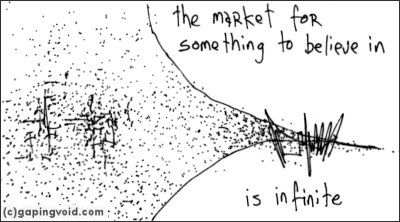Be findable by escaping the jaws of mediocrity

The markets and the world at large wants to pull you to the center. That safe, predictable place that appeals to the most people. It's the all things to all people sector. And it has a fierce grip on us.
This is also where you're the least likely to stand out and make a difference that matters. The center is where mediocrity lives and obscurity reigns. The center is about standardization. The factory. Dreams die here. To be mediocre and obscure is to be a replaceable cog. Harsh? Yes.
"To be mediocre means to be conspicuously lacking in distinction or imagination." -Adrian Furham
Escaping mediocrity takes work of course. And giving up peanut butter. Yes, that wonderful euphemism of spreading yourself thin to be more dynamic, versatile and able to pivot on a moment's notice. To insulate yourself from choosing the wrong thing to focus on when the market moves on. In other words, to put an egg in many baskets.
Pick a basket and put your eggs in it. And learn to pivot from there. This is often called creating your own personal monopoly (note current buzzword trend): that area the market craves and you excel. Online you face global competition. When you're like everyone else, you have to advertise to be found. But if you're unique, you can position yourself to be found in a google search. If you rely on advertising, you always need to advertise. But by being unique and creating content around that uniqueness that draws people in, you build an asset. The catch is time and sweat vs. money (and sweat because you still need to create something people want to buy).
Hugh Mcleod of Gaping Void has a famous cartoon that the market for something to believe in is infinite. Your job, should you accept it, is to be someone doing work that others believe in.

We also all want to belong. And we want to matter. We want our work to matter.
Hugh owns cartoons drawn on the back of business cards.
Here's someone who owns the niche for marketing cartoons: Tom Fishburne, The Marketoonist
David Perell owns writing online and creating personal monopolies.
Being known for something and creating a brand around it gives you something defensible. There's a lot of crap out there. Useless products and services hawked for the sole purpose of making money for the hawkers with little regard for the customer. There are oodles of brands that are hollow. Here at Own The Cow, I focus on helping others create personal brands with substance and style. Ones that deliver real value where the customer is so glad they met each of them. And that create real value and sense of accomplishment for the brand holder. That's you.
Let's talk about Micromanagement for a moment
Now I'll turn to something potentially a bit controversial but that's music to the ears of control freaks: the power of micromanagement.
Micromanagement gets a bad wrap. No one wants to be micromanaged. We all want to be empowered and have sovereignty over our work. The catch is as the creator or leader with a solid vision, it's darn hard to get everyone rowing in the same direction at the same level of performance.
Jerry Seinfeld talked about micromanaging every aspect of his show. He left nothing to chance. That can cause burnout and is likely why the show ended after 9 seasons.
I'm sure you can think of some other famous people known for micromanagement: Martha and Steve anyone?
"To do great things, to really learn, you can’t shout suggestions from the rooftop then move on while someone else does the work. You have to get your hands dirty. You have to care about every step, lovingly craft every detail." - Tony Fadell
There's power in ensuring every last detail is sorted. I also believe you don't have to be an ass about it. You can micromanage firmly by setting the example, holding others accountable by building processes that ensure projects move along. That there's appropriate reviews along the way and that your teammates understand the 'why' and believe in the mission.
Like most things micromanagement vs. empowerment isn't an either or. And if your name's on the line, you don't want to leave things to chance.
